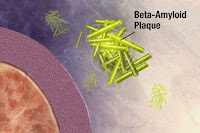Diagnosing Alzheimer’s just took a giant step forward.
Swedish researchers have published a new, internationally recognized method to measure the main protein that causes it. Learn how this will mean better drugs, better diagnosis and better treatment.
Researchers at Gothenburg University have developed a reference method for standardized measurements that diagnose Alzheimer’s disease decades before symptoms appear. The method has now formally been classified as the international reference method, which means that it will be used as the standard in Alzheimer’s diagnostics worldwide.
Beta Amyloid in the Healthy Brain
Everyone naturally builds the beta amyloid protein in his or her brain. The protein’s normal function is not completely mapped, but one theory is that it participates in the formation and removal of synapses, which is vital in enabling the brain to form new memories.
Beta amyloid built by healthy people is quickly transported out to the spinal fluid and blood.
When Beta Amyloid Remains in the Brain
But with Alzheimer’s, the beta amyloids remain in the brain, where they clump together and begin to damage the synapses, which leads to brain, nerve cell death.
This process can begin in middle age and continue unnoticed for decades until the nerve cells are so damaged that symptoms take the form of a memory disorder and impaired cognitive abilities. At that point, the disease is felt to be too advanced to be treated, so intensive worldwide research is underway to find methods that diagnose Alzheimer’s sooner.
Exact Measurements Allow Extra-Early Diagnosis

After decades of research, Henrik Zetterberg and Kaj Blennow at Sahlgrenska Academy, Gothenburg University, were able to develop a method that measures the exact amount of beta amyloid in spinal fluid and diagnose Alzheimer’s ten to thirty years before the disease becomes symptomatic.
“If the concentration of beta amyloid in the spinal fluid is abnormally low, it indicates that the protein is sticking in the brain, which is the earliest sign of Alzheimer’s disease,” says Henrik Zetterberg.
Wide International Recognition
The Gothenburg researchers’ pioneering studies have gained wide international recognition since the measurement method they developed was approved as the global reference method.
“This means that the method will be used as the norm for standardizing beta amyloid measurements around the world. With the help of the standard, people who are worried about Alzheimer’s disease can be tested, and get the same results regardless of whether it is done in San Francisco, Sao Paolo, London, Gothenburg or Cape town,” says Kaj Blennow.
“We put a lot of effort into this project and it has been initiated and conducted, and now completed by us at Gothenburg within the framework of a global cooperation project that we head,” says Henrik Zetterberg.
New Drugs Will Work Better & Sooner

This major advance coincides with recent studies that show promising results for different drug candidates that attack Alzheimer’s disease and target beta amyloids.
“These new drugs will likely prove most effective for persons who have just begun to accumulate beta amyloids in their brain. Then a well-proven and standardized method becomes crucial, as it ensures that these people are identified in a diagnostically safe and precise manner,” says Kaj Blennow.
Standardization
The global reference method is established by the global platform, the Joint Committee for Traceability in Laboratory Medicine (JCTLM), whose goal is to promote and provide guidance on equivalent, internationally recognized and accepted measurements within laboratory medicine. JCTLM is a collaboration between three global, standardizing institutions:
- The International Committee for Weights and Measures (CIPM)
- International Federation for Clinical Chemistry and Laboratory Medicine (IFCC)
- International Laboratory Accreditation Cooperation (ILAC).
MORE INFORMATION – Contact:
- Henrik Zetterberg, Professor at the Institute of Neuroscience and Physiology, Sahlgrenska Academy
031-343 0142
0768-67 26 47
henrik.zetterberg@gu.se - Kaj Blennow, Sahlgrenska Academy at Gothenburg University
031–343 1791
0761–073 835
kaj.blennow@neuro.gu.se
SOURCE:
- BY: KRISTER SVAHN
- Originally published on: sahlgrenska.gu.se












It is a reference method, so it should be available.
Is this test already available in the US? If so, where?
This is wonderful, Congratulations to the researchers who developed this !! However, given the risks of spinal taps – I am wondering how long before there could be a method with the same kind of reproducibility and accuracy in blood ??